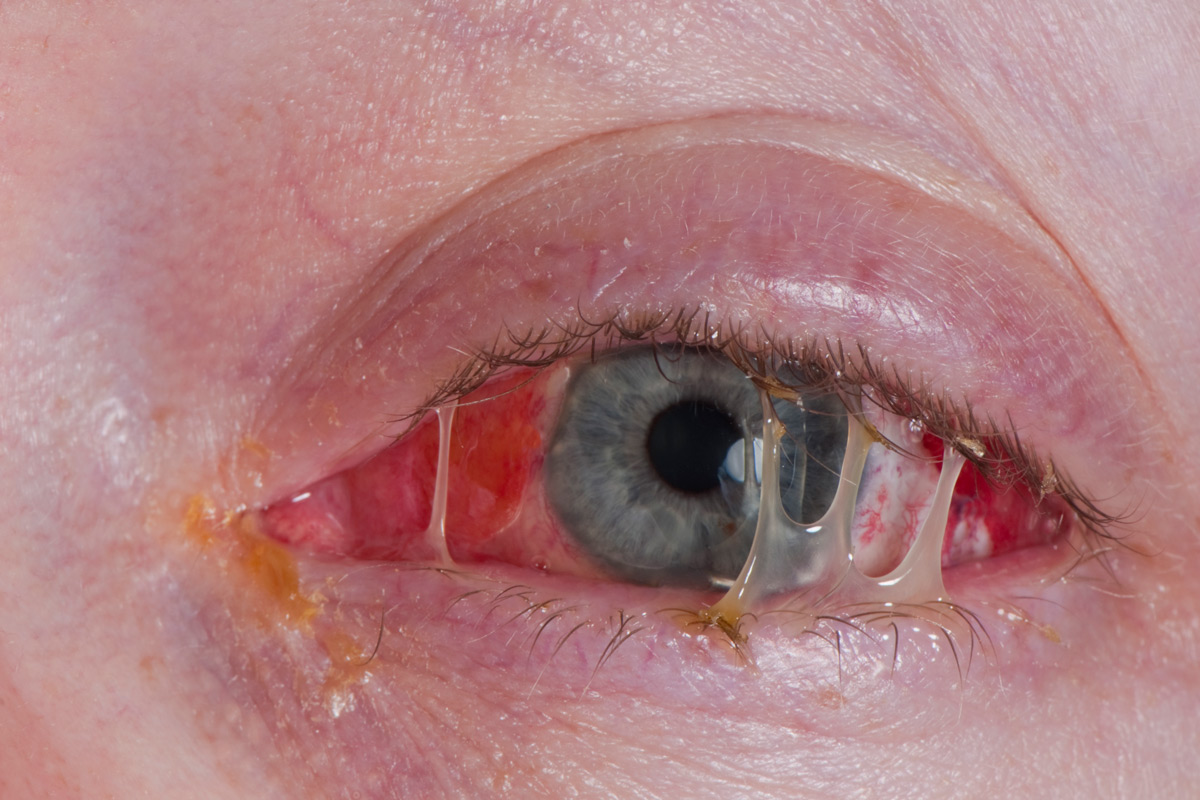Many cases of eye infections begin with eye discomfort, redness and itchiness. Some cases can lead to vision loss. It’s important to see a healthcare provider to determine the exact cause and find the correct treatment.
Advertisement
Cleveland Clinic is a non-profit academic medical center. Advertising on our site helps support our mission. We do not endorse non-Cleveland Clinic products or services. Policy

Image content: This image is available to view online.
View image online (https://my.clevelandclinic.org/-/scassets/images/org/health/articles/25000-eye-infections)
An eye infection is a disease of the eye that you get because of a microorganism like a bacterium, a virus or a fungus. The most common eye infection is pink eye (conjunctivitis).
Advertisement
Cleveland Clinic is a non-profit academic medical center. Advertising on our site helps support our mission. We do not endorse non-Cleveland Clinic products or services. Policy
Viruses cause most cases of pink eye, but bacteria can cause pink eye, too. You can’t treat viral infections with antibiotics. Antibiotics only work on bacterial infections.
Eye infections can happen in one eye or both eyes. Some infections aren’t serious. Others are medical emergencies that can cause vision loss. Eye infections can affect nearly any part of your eye.
You can have an infection on your eyelid, your conjunctiva or cornea, or the external parts of your eye.
Eye infections are common. About 1 million people in the U.S. go to their healthcare providers or to hospitals with eye infections each year. Many of these infections happen to people who wear contact lenses.
An infected eye may look or feel different than usual. Early signs and symptoms of an eye infection may include:
Later signs and symptoms of eye infections may include:
Advertisement
You can get eye infections from bacteria, fungi (plural of fungus), parasites and viruses. These small organisms can enter your eyes in many different ways, including eye injuries.
One of the most common ways to get an eye infection is to sleep in your contact lenses. It’s also common to get an eye infection if you don’t properly clean your lenses.
Both gram-negative and gram-positive bacteria can cause eye infections. Gram-negative bacteria are bacteria that providers can’t see during a Gram stain test, though they’re detectable in a bacterial culture test. Gram-positive bacteria are visible in a Gram stain test. Some of the more common bacterial causes of infections in your eyes include:
Fungi belonging to the Candida species cause about 66% of endophthalmitis cases that happen after corneal transplant surgery. You might also get a fungal infection after cataract surgery.
You can get an eye infection if you have an eye injury because of an item from the outdoors, such as a stick or a plant, contaminated with Fusarium. You can also get an eye infection that happens because of a fungal bloodstream infection.
You might be able to tell if you have an eye infection, but it’s best to consult a healthcare provider. They’ll take your medical history, ask you questions about your symptoms and do a thorough eye exam. They may also take a swab of any discharge from your eye to send to a lab for testing.
Treatment for eye infections depends on what’s causing your eye infection. It might include anti-infective medication in various forms, such as eye drops, ointments or tablets. It usually takes 24 to 48 hours for antibacterial medications to work.
You may have to let viral or allergic infections clear on their own, but you may be able to make yourself more comfortable with the following home remedies:
Eye infections due to allergies aren’t contagious or dangerous to your sight. You don’t need to avoid other people.
You can spread eye infections due to viruses, bacteria or fungi to other people. You should avoid being around others until you treat your condition.
Some eye infections are dangerous to your vision, such as those due to eye injuries and infections of your cornea. This is why it’s best to contact an eye care specialist to evaluate your eye. They’ll know what’s causing your eye infection and how to treat it effectively.
Advertisement
You may not be able to prevent every eye infection, but you can take steps to reduce your risk. These may include:
If you have allergies, you might be familiar with eye irritation. But it’s a good idea to see your healthcare provider about any eye condition that’s causing discomfort, pain, discharge or problems with your vision.
You’ll need immediate medical help for eye injuries. In some instances, you’ll need treatment to prevent certain eye infections causing vision loss. Oftentimes, eye doctors are available “on call” after hours or on weekends to address these types of vision-threatening infections.
Despite layers of protection, eyes are vulnerable to disease. Eye injuries and systemic (throughout the body) diseases can make you vulnerable to eye infections. Even though you may be familiar with symptoms of redness or irritation in your eye, it’s important to have a healthcare provider examine you and diagnose what’s causing the problem. Some eye infections can cause serious problems without proper treatment. People who wear contact lenses should be especially careful.
Advertisement

Sign up for our Health Essentials emails for expert guidance on nutrition, fitness, sleep, skin care and more.
Learn more about the Health Library and our editorial process.
Cleveland Clinic’s health articles are based on evidence-backed information and review by medical professionals to ensure accuracy, reliability and up-to-date clinical standards.
Cleveland Clinic’s health articles are based on evidence-backed information and review by medical professionals to ensure accuracy, reliability and up-to-date clinical standards.
Cleveland Clinic’s ophthalmologists and optometrists have the highest training available. We provide exams, vision correction and care for many eye conditions.
